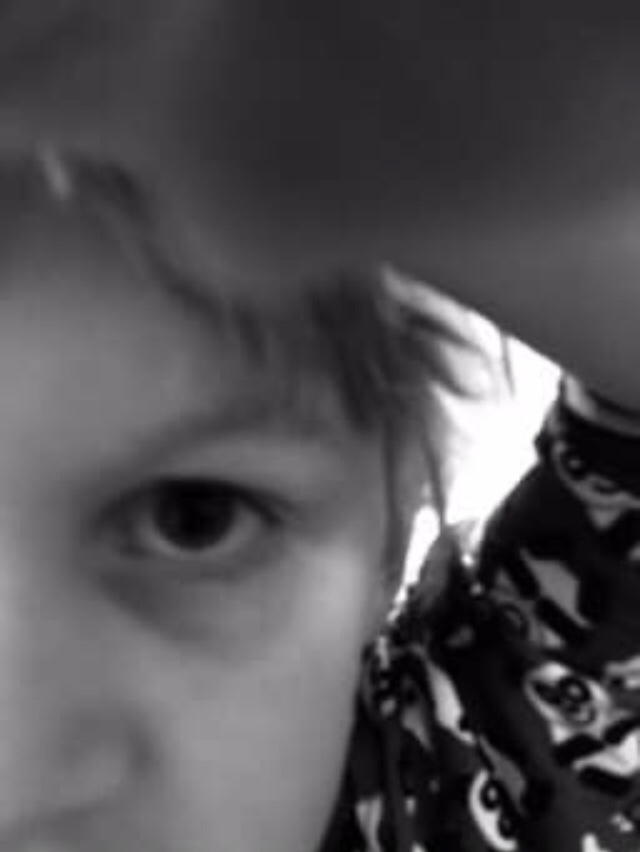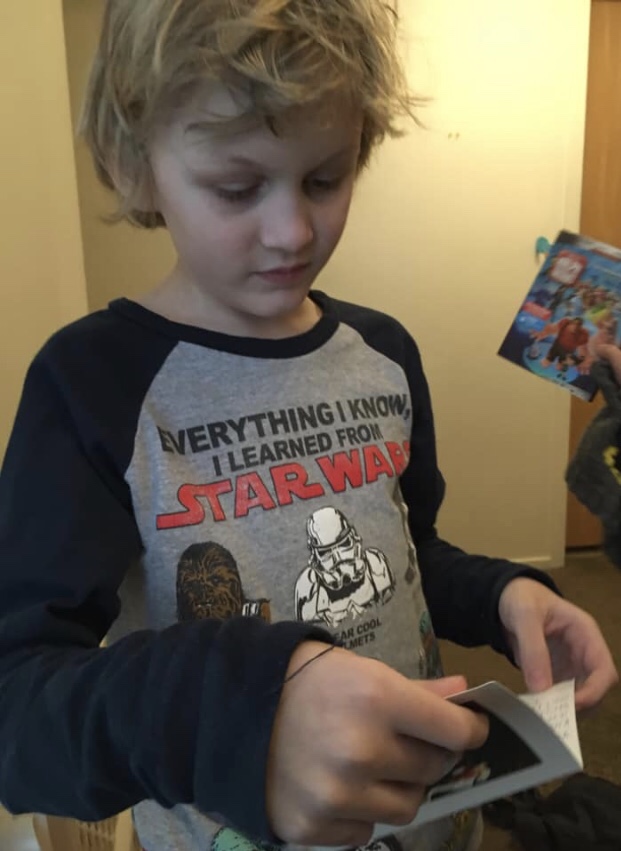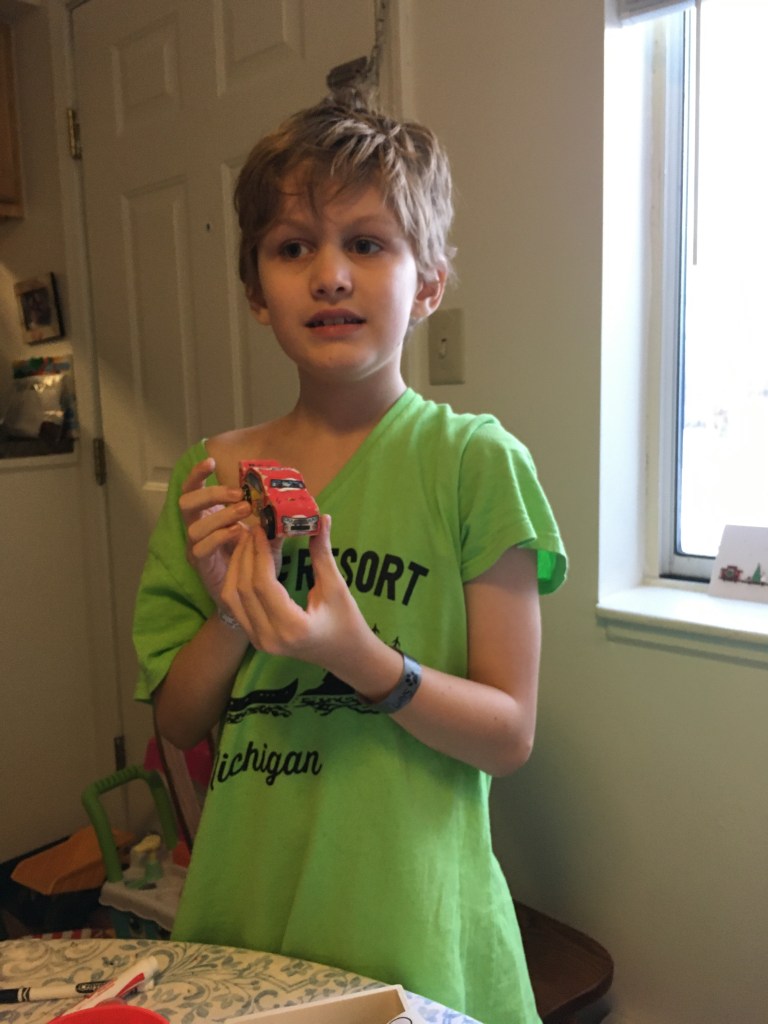
I’ve read so many times on autism parenting pages about parents being super upset when they tell someone that their child has autism and the listener responds with, “They don’t look autistic” and honestly, these upset parents have a point. What does someone with autism look like exactly? Are these responses confused with people with Down syndrome? Or some other physical disability?
My brother and sister in law actually do have a beautiful daughter who was born with Down syndrome. Once when I was talking with my brother he said that he thought we had it harder raising our son, mr. L with autism then they did with their daughter. He said because strangers could recognize his daughter’s disability physically, they gave them more of a break when things got stressful in public. Where as with our son, if he had a melt down or was just having a rough moment, people don’t necessarily recognize that there could potentially be a mental disability and be more understanding.

Instead, people are quick to judge my child as naughty, bad, disrespectful, or spoiled. And they often give judging looks towards my husband and I, assuming we lack discipline skills, spoil, enable the behaviors, and should figure out how holy the gift of spanking apparently is 🙄
Honestly I don’t notice the stares anymore. I don’t care if strangers think I suck. Taking care of my child is far more important than Karen’s dire need for me to know how she feels about my child’s behavior.

But if I do happen to notice George and Anita staring wide eyed or glaring, I don’t mind staring right back with a great big smile on my face until they awkwardly high tail it out of there.
But back to my original point, there actually are “looks” to autism. Not always, because everyone on the spectrum is unique and have different reasons for being diagnosed. But still, we as a family do see others on the spectrum when we go out.

I say as a family, because even though my boys don’t verbally tell me they found other kids with autism, my husband and I see our sons naturally gravitate to those we think are on the spectrum. Mr. L will play with anyone on the spectrum regardless of age and mr. C tends to play with kids his age or younger who seem to have social disabilities.
So here’s the secret, the “look” is not a physical give away. It’s a way in how they interact with the world around them. A few things that I notice; headphones, flapping arms, wiggling their fingers by their face when they get excited, full body waving, jumping, or a full body random shake when trying to communicate. Also, moving away from other humans in an uncomfortable way who happen to walk past. There can just be this unspoken avoidance of the humans around them, until you reach out to them or their parent.

So yes, there can be a difference, but it’s less of a physical look, and more of a physical act. I personally think that this is where the stress that adults with autism talk about partly comes from. I’ve read that some adults with autism feel so stressed because they feel like they need to conform, hide, or pretend to act like the neurotypical people around them. They have been taught either by teachers, peers, or society that to be aloud around others they have to hide the natural way they stand and move.
I wish that wasn’t a thing. I think being unique is wonderful and keeps things interesting. When I see children on the spectrum I like to reach out if the situation is appropriate. When I took my son, mr. L to a train exhibit he wanted to look at some posters that a teenager and his grandpa were looking at. When mr. L moved up, the teen moved quickly and uncomfortably away like he didn’t want to be touched or interacted with. The way he didn’t look at his grandpa when he told him he wanted to look at a train near by gave away the possibility that he might be on the spectrum.

I told his grandpa we didn’t mean to scare the teen away, and the older man mumbled something along the lines that that was just how his grandson was and that it wasn’t a big deal. I said, “I get it, this is my son mr. L and he has autism” the man lit up and said, “So is my grandson!” I smiled and told him I thought he might be. Soon mr. L was wandering around with the teen. The two flowed together and drifted apart and back together in some unspoken pattern that I will probably never understand, and his grandfather was excited to have an an adult comrade to talk about raising a boy on the spectrum with.
Has anyone told you, you or your child didn’t look autistic? Do you have any other tics or quirks that you usually pick up on as a possible give away as autism? Tell us about it 😊

I also see movements and interactions, but I think it is because I have tried to understand. I learned as part of my medical training and I strive to be a harbor for Mr. L as much as I can.
I think what “people” don’t do well is pay attention when there are usual moments. No one pays attention until something catastrophic is happening, and then they gawk as if it was completely shocking. If they had been paying attention all along, they probably could have helped make a better environment for everyone.
This thought extends beyond autism though, I think. People need to be more conscientious.
LikeLiked by 1 person
You are a wonderful harbor for mr. L and he knows it 😊
And I completely agree, people in general are not great at paying attention. I also agree that it goes past autism. For example, a man wouldn’t have passed out if someone would have noticed he was sweating and looked red in the face and had him sit down. Or that kid wouldn’t have dropped eggs all over the floor if someone had noticed him struggling to get them off the shelf and offered a hand.
Life would run smoother if people payed more attention, had the courage to offer help, and if people would take the help.
I am a firm believer in preventative care.
LikeLike
I absolutely agree that the way they interact with the world is usually a dead give away. I’ve worked with a lot of children with autism and they appeared indistinguishable from neurotypical people until a closer look reveals idiosyncrasies. There’s actually a good chance my husband is somewhere on the spectrum, but he’s so high functioning he’s slipped under the radar and may not even fully qualify for a diagnosis. But I see he has deficits in communication and struggles to read people. Our conversations often tend to be different from those I have with other people, especially since his filter has many gaping holes, and I subtly kick him a lot when were talking to other people because he has no boundaries and can’t see when someone’s trying to inch away. Otherwise, it’s almost impossible to tell he has features of autism.
LikeLiked by 1 person
That’s really cool how you help and work with your husband. I have a brother who is an adult who just got diagnosed with autism but growing up, no one suspected anything was there to diagnose. He too just slipped under the radar. He always wanted to sleep after school- from being overstimulated, he was socially awkward- because he couldn’t read social norms or body language. He acted average, was academically advanced, but turns out he was really struggling and didn’t even know it.
LikeLiked by 1 person
The more we learn about autism and the more accurate the diagnosis becomes, the more I look at the adults around me to see if there are others like your brother and my husband. It’s still such a new diagnosis, and I can’t help but wonder, if it had come to light sooner, how it could have really helped the adults who know finally find out why they have struggled, why they felt different.
LikeLiked by 1 person
Agreed, and the optimistic in me wonders if more adults would be kinder if they had been better understood (possibly diagnosed) as children.
LikeLiked by 1 person
I used to register my little boy for art programs that our city would put on. One time my son started to have a mini melt down (usually around the start of a class when instructions were being told) and I took him out of the class when he started to seem overwhelmed. I had pecs cards I used with him when he was nonverbal and as soon as he calmed down I went back into the class to help him participate with the other kids and art project. One of the mothers in the class always glared at me from the very first day but that day my son had a melt down she turned to her friend and said out loud “Don’t they have a different class for kids like him?” and she said it in a mean and cruel manner.
I learned to block so many people when out in public because of all the cruel and judging ways. It is shocking to me how our world has become with it’s lack of empathy. I even had public school teachers treat my son and daughter in cruel ways. I wasn’t the only one who witnessed these things either.
I stuck with it though. all the sneers, glares, cruel words and discouragement that some out there in the world threw my way when all I was trying to do was teach my little boy how to survive in the world his mother and father lived in. It is nice in the Autism world, with peacefulness, soft lights and soft things but sometimes we have to step into different environments and that is what was trying to teach both my children when little.
My son was non-verbal for years, but now he speaks, he reads, he writes and is attending college. I think back on that first day he was diagnosed and how my husband and I were scared to death of his future. There were lots of tears that first year but then I did everything I could to help him knowing that I am not perfect, no ones is and whatever the outcome my kids, as all kids, are all beautiful little souls in their own unique ways.
When I ask my son about his early years and all the things we did like going to Lego land, chalk fest in Little Italy, the zoo, family events etc….he always answers that he doesn’t remember any of that.
He will always have autism, and if you are around him long enough and you know how Autism works you will be able to pick that up in him, just like your post says here. Great post, thank you for sharing and educating more people out there on this subject. You and your family have a great week.
LikeLiked by 1 person
Good for you for learning to ignore the cruel/ oblivious/ rude behavior of some strangers. Even acknowledging that negative energy can be exhausting! Thank you for sharing your child’s progress, it is very encouraging to hear. And you are right, the first year after the diagnosis can be so scary and tear filled.
LikeLike
Great post. I recently read something to the effect that sometimes you can’t see autism on the outside, but you have to get to know the person to see it. I thought that was an interesting comment. It made me think. I notice some things you mentioned. I also sometimes see something in the eyes – darting around, panic, aversion to looking at people, downward looks. Sometimes the way a person walks, the body tone.
LikeLiked by 1 person
Agreed! I like your choice of words- body tone. It is more of a feeling then an obvious physical look. And I think you are right, you have to get to know the person to see it. I have a sister who has a daughter who obviously has autism, but she hides it every time my sister tries to get her tested/ diagnosed. It has been very frustrating to their family. The professionals say she is fine and then she gets home and has her meltdown from acting “good” or “normal” in public.
LikeLike
Wow! Sophisticated masking.
LikeLiked by 1 person
Exactly.
LikeLike
absolutely agree. blessings to your wonderful children
LikeLiked by 1 person
Thank you ☺️
LikeLiked by 1 person